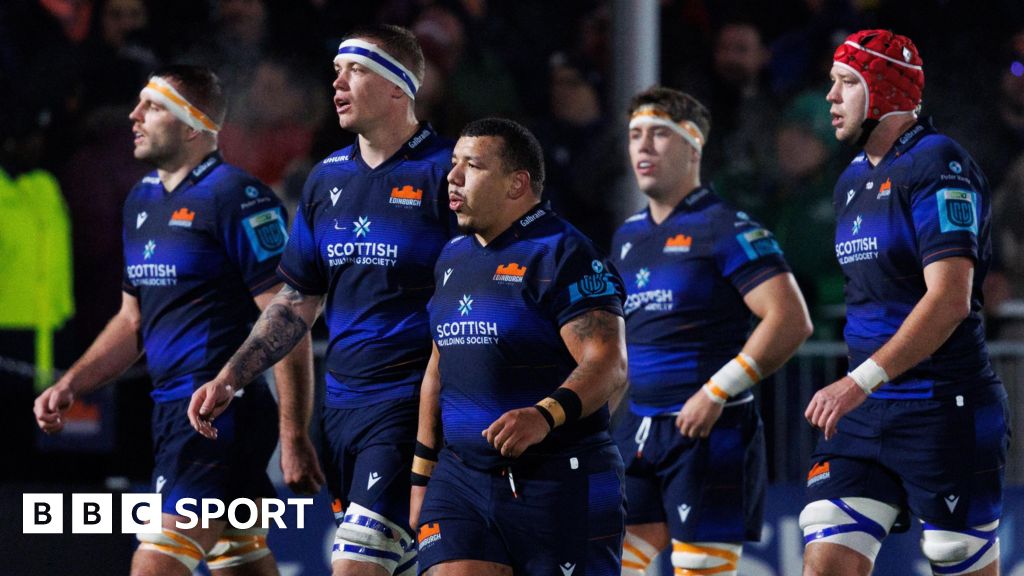- Author, Andy Burke
- Role, BBC Sport Scotland Senior Reporter
Even as Edinburgh were amassing 11 victories in this regular United Rugby Championship season – a total bettered by only five of the 15 other sides in the competition – there was a sense that something was not quite right.
On some of the days Sean Everitt’s men came out on the right side of the result, there was a nagging feeling this collection of talent was performing within itself.
On a hot, sticky day in Treviso when they knew only their best would do to beat a strong Benetton side, an Edinburgh team featuring 12 internationals – two of them Test Lions – in their starting line-up produced their worst performance of the season in a 31-6 defeat.
With the likes of Grant Gilchrist, Jamie Ritchie and Ali Price on the pitch, leadership should not have been a problem, but it was.
With an experienced front row of Pierre Schoeman, Ewan Ashman and WP Nel, the set piece should not have been a problem, but it was.
Injuries have taken their toll particularly in the back-line, but none of the experienced heads stood up to lead the way. Ben Healy, Duhan van der Merwe and the rest, they simply faded away as Edinburgh’s season followed suit.
It’s a deeply unsatisfying denouement to the campaign, not least for the likes of Nel and Bill Mata. Two titans of the club now depart the scene with a bitter taste following a desperate capitulation in their final match in Edinburgh colours. They deserved better.
How to explain a team performing so far below their best when the stakes are at their highest? It’s a question asked of Scottish sides for years now.
Even restricting examples to the past 12 months, one can point to Glasgow Warriors’ dreadful misfire against Toulon in last season’s Challenge Cup final, Scotland’s horrendous implosion against Ireland in their World Cup pool decider or their shock defeat in Rome that put paid to yet another Six Nations title challenge.
Are these moments of failure all linked? Is there a theme here with many of the same players involved time and time again?
As former Scotland captain John Barclay – a man who played alongside many of these players – said recently on the BBC Scotland Rugby Podcast, there is only so long you can say the problem is not a mental one. At some point you have to accept that there is an issue there.
Heart and desire will only take you so far and when even that is missing, you end up on the receiving end of a beating the type of which Edinburgh were subjected to in Treviso.
Benetton were outstanding on both sides of the ball, but boy were they helped along the way by the visitors’ toothless display.
From a game-plan based around a nasty, dominant pack under Richard Cockerill, to a wider, more backs-oriented game under Mike Blair, Edinburgh seem to be falling, unsuccessfully, between two stools under Everitt.
The pack is not offering the platform needed to create space for the back-line, and when they do it is often hard to decipher what that back-line is trying to achieve. Their decision-making in when to go wide and when to play tight too often lets them down.
Everitt will point to the injury list as mitigation and there’s no doubt that greater access to the likes of Darcy Graham and Emiliano Boffelli would have improved chances of a successful season.
However, there are deeper underlying issues that need to be addressed in the summer if Edinburgh are to avoid the kind of malaise that coloured the reign of Everitt’s South African compatriot Alan Solomons towards the end before his departure in 2016.
The club has much more going for it now than it did then. A permanent home for starters which, when Edinburgh are on it, creates the type of atmosphere that can create a tangible advantage.
The squad needs some additions in key areas and the arrival of Mosese Tuipulotu, brother of Glasgow and Scotland centre Sione, will address the lack of creativity and penetration in midfield.
These should be minor tweaks to a group that, on paper, should be challenging for top four in the URC rather than scrambling around for, and ultimately missing out on, a top-eight finish.
Everitt will get the chance to go again next season, but his team will not want to test the patience of supporters any more than they have already in a campaign that has simply not been good enough.

